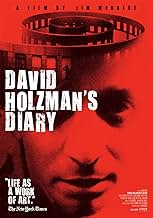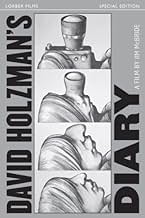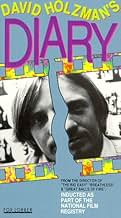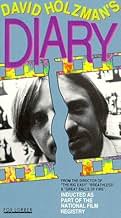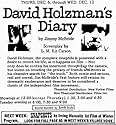AVALIAÇÃO DA IMDb
6,5/10
2 mil
SUA AVALIAÇÃO
Adicionar um enredo no seu idiomaA young filmmaker decides to make a movie of his life.A young filmmaker decides to make a movie of his life.A young filmmaker decides to make a movie of his life.
- Prêmios
- 2 vitórias no total
Eileen Dietz
- Penny Wohl
- (as Penny Wohl)
Mike Levine
- Sandra's Boy Friend
- (as Michel Lévine)
Robert Lesser
- Max, Penny's agent
- (as Bob Lesser)
Avaliações em destaque
Wildly unconventional and sadly underrated, "David Holzman's Diary" is, in my opinion, the greatest "found footage" film ever made. While "found footage" is a genre normally associated only with horror movies, and wasn't even a term in 1967, this still plays out extraordinarily similarly to a film like "The Visit" or "Willow Creek". However, it is much, much better and is a tragicomedy rather than a horror flick.
Before delving into the depths of this obscure oddity, one must be aware that it is a highly satirical film. It mocks the avant garde and cinema verite movement in a deadpan and, at times, subtle way. It portrays those who attempted to find art and truth in the painfully mundane as people who are pretentious, delusional, and occasionally creepy. Of course, I am something of a fan of these movements, but it is important to also note that the film isn't mocking ALL cinema verite or experimental films, just the highly pretentious and annoyingly boring ones that began to spring up back in the mid to late 60's.
Although he is something of an antihero, the film also gives poor David Holzman some sympathy as we witness his life steadily decay due to his cinematic obsession. It's tragic, it's satiric, and it's comic.
Before delving into the depths of this obscure oddity, one must be aware that it is a highly satirical film. It mocks the avant garde and cinema verite movement in a deadpan and, at times, subtle way. It portrays those who attempted to find art and truth in the painfully mundane as people who are pretentious, delusional, and occasionally creepy. Of course, I am something of a fan of these movements, but it is important to also note that the film isn't mocking ALL cinema verite or experimental films, just the highly pretentious and annoyingly boring ones that began to spring up back in the mid to late 60's.
Although he is something of an antihero, the film also gives poor David Holzman some sympathy as we witness his life steadily decay due to his cinematic obsession. It's tragic, it's satiric, and it's comic.
David Holzman's Diary comes close to the "dream" of what was possible in the ideal of the American independent cinema of the 1960s. Taking the lessons of John Cassavetes with Shadows and French new wave filmmakers, specifically Godard and Truffaut, Jim McBride decided that shooting a narrative with a documentary approach- following the characters hand-held, without the artifice of a constricting studio- wasn't quite enough to get at a really personal cinema. At the same time his film is something of a cunning, if not always obvious, attack on "personal docu-style" essay movies. The idea that anyone can get a camera and make a movie or something on film about their lives has now mutated into something else with reality TV (True Life on MTV is like a professional extension of David Holzman's Diary), but at the time this was something extraordinary to attempt. And even today, it still shows.
This doesn't mean David Holzman's Diary is perfect, but then how could it ever be? Or would anyone in their right mind think it should be? It's imperfections are part of its... I won't say charm, since the film isn't exactly "charming", but it's got a certain something to it by having some longer takes, some shots or moments that are extended on David Holzman going on and on to the camera about his life, or what little there is of it. It's got that randomness of a diary, of anything popping into one's head put down on record. And that aspect, about film being "truth 24 frames a second, is one of the strongest things about it. It's message is both clear and hard to take: film is something that creates a reality of its own, as the male interviewee says, that a person can't have their own reality because of an aesthetic addition or distraction to it.
This won't be news to anyone who's seen docu-horror films like Blair Witch Project or Diary of the Dead, but the difference here is that of high-minded artistic aspirations. David Holzman is a filmmaker already, so to make a film about himself, mostly with him in his apartment pondering things like Vincente Minelli or Truffaut's comment on a woman's flicking of a wrist like Debbie Reynolds, it's bound to be pretentious. The trick is to know that McBride is mocking this particular high-and-mighty artist who does have some good intentions, while at the same time making a very personal kind of film. Seeing McBride and Michael Wadleigh's camera going down a block, put to the local radio station, then going past old people's faces in close-up in a park or going by a cop who may or may not know a "film" is being shot, is incredible on-the-fly material. That or just Holzman shooting out of the window as a voyeur on another woman in an apartment reveals as much about the character as the filmmaker making the film within the film. Did I mention that Holzman, long before the semi-tragic ending, shoots the television at night one frame every single cut and then puts all the frames together? It's awe-inspiring and breathtaking.
Might sound confusing, but it's worth it to take the experience if you know what you're getting, which is an experiment as much as a essay-style narrative. This doesn't mean all the performances are very good (I liked the woman in the car very much, the girl playing Penny or the male guy being interviewed not so much), but some moments, some truly cinematic experiences come out of it. 9.5/10
This doesn't mean David Holzman's Diary is perfect, but then how could it ever be? Or would anyone in their right mind think it should be? It's imperfections are part of its... I won't say charm, since the film isn't exactly "charming", but it's got a certain something to it by having some longer takes, some shots or moments that are extended on David Holzman going on and on to the camera about his life, or what little there is of it. It's got that randomness of a diary, of anything popping into one's head put down on record. And that aspect, about film being "truth 24 frames a second, is one of the strongest things about it. It's message is both clear and hard to take: film is something that creates a reality of its own, as the male interviewee says, that a person can't have their own reality because of an aesthetic addition or distraction to it.
This won't be news to anyone who's seen docu-horror films like Blair Witch Project or Diary of the Dead, but the difference here is that of high-minded artistic aspirations. David Holzman is a filmmaker already, so to make a film about himself, mostly with him in his apartment pondering things like Vincente Minelli or Truffaut's comment on a woman's flicking of a wrist like Debbie Reynolds, it's bound to be pretentious. The trick is to know that McBride is mocking this particular high-and-mighty artist who does have some good intentions, while at the same time making a very personal kind of film. Seeing McBride and Michael Wadleigh's camera going down a block, put to the local radio station, then going past old people's faces in close-up in a park or going by a cop who may or may not know a "film" is being shot, is incredible on-the-fly material. That or just Holzman shooting out of the window as a voyeur on another woman in an apartment reveals as much about the character as the filmmaker making the film within the film. Did I mention that Holzman, long before the semi-tragic ending, shoots the television at night one frame every single cut and then puts all the frames together? It's awe-inspiring and breathtaking.
Might sound confusing, but it's worth it to take the experience if you know what you're getting, which is an experiment as much as a essay-style narrative. This doesn't mean all the performances are very good (I liked the woman in the car very much, the girl playing Penny or the male guy being interviewed not so much), but some moments, some truly cinematic experiences come out of it. 9.5/10
I guess you would get confused if you didn't understand the hype and hoopla surrounding the cinema verité movement during this era.
David Holzman's Diary serves to lampoon cinema verité by showing one dull, overly introspective scene after another. It's a thinly-veiled attack on what director Jim McBride saw as a pretentious cinematic form.
The fact that cinema verité is not widely regarded today (except in film schools) is a testimony to how dated this film now appears. That said, Roman Coppola endlessly references this film in his debut, "CQ". Perhaps McBride's film will enjoy a bit of a renaissance.
David Holzman's Diary serves to lampoon cinema verité by showing one dull, overly introspective scene after another. It's a thinly-veiled attack on what director Jim McBride saw as a pretentious cinematic form.
The fact that cinema verité is not widely regarded today (except in film schools) is a testimony to how dated this film now appears. That said, Roman Coppola endlessly references this film in his debut, "CQ". Perhaps McBride's film will enjoy a bit of a renaissance.
Jim McBride's mockumentary is a delightful satire about the filmmaker's compulsion to capture everything on camera, and also a wry character study of one young man who uses his "art" as a pretext for complete self-absorption. This film from the sixties eerily forecasts our present absorption with social media.
As played by L.M. Kit Carson, David is on an irreconcilable mission: to at once understand a world in chaos, and cocoon himself from it in his own cinematic world.
He is lucky that his girlfriend ( Eileen Dietz) didn't chuck his camera when he filmed her sleeping nude.
One thing I found fascinating is the "Observer Effect" as defined by David. Once you start filming, you cease to have reality as you change in response to the film. It is not real life, it is a movie. One would wonder here, if you wore a GoPro Hero all day would you record a normal day, or would you look for the abnormal?
With irritation, alienation, a sex-hungry lady sitting in a car in the middle of traffic, and a few bloody noses, this one "Diary" worth peeking into.
As played by L.M. Kit Carson, David is on an irreconcilable mission: to at once understand a world in chaos, and cocoon himself from it in his own cinematic world.
He is lucky that his girlfriend ( Eileen Dietz) didn't chuck his camera when he filmed her sleeping nude.
One thing I found fascinating is the "Observer Effect" as defined by David. Once you start filming, you cease to have reality as you change in response to the film. It is not real life, it is a movie. One would wonder here, if you wore a GoPro Hero all day would you record a normal day, or would you look for the abnormal?
With irritation, alienation, a sex-hungry lady sitting in a car in the middle of traffic, and a few bloody noses, this one "Diary" worth peeking into.
Mock cinema vertite about a young filmmakers consternation at finding 'truth' and putting it on film. Insightfully examines how we define reality, how our perceptions can cloud it, and whether it is really possible to show it on film. Probably to talky for most, but still quite thought provoking. Filled with some really offbeat ideas and camerawork. Among them: filming the faces of people at a bus stop while we hear excerpts from the McCarthy hearings. Also photographing a entire night of tv viewing each minute and then playing them back frame by frame. A very low budget movie, made by some very young filmmakers, with a very original point of view.
Você sabia?
- CuriosidadesShot on a budget of only $2,500.
- Erros de gravaçãoHolzman shows a montage of TV he says he watched on a Tuesday night in July 1967. He was wrong about the night. Although it's hard to date the Huntley/Brinkley Report newscast or the Joey Bishop Show late-night talk show, neither Batman, Star Trek or the Dean Martin Show aired on a Tuesday night. In July 1967, Batman aired on Wednesday and Thursday nights and Star Trek and the Dean Martin Show aired on Thursday nights. The montage is from a Thursday night.
- Citações
David Holzman: It was like rooms everything is so perfect, that everything is so perfect that they have to be kept, that because this random particular accidental state so meaningful, so, so touching, it's so touching, it's so beautiful.
- ConexõesEdited into 365 days, also known as a Year (2019)
Principais escolhas
Faça login para avaliar e ver a lista de recomendações personalizadas
- How long is David Holzman's Diary?Fornecido pela Alexa
Detalhes
- Tempo de duração
- 1 h 14 min(74 min)
- Cor
- Mixagem de som
- Proporção
- 1.37 : 1
Contribua para esta página
Sugerir uma alteração ou adicionar conteúdo ausente


